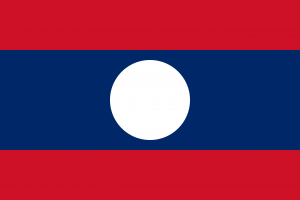Difference between revisions of "Language/Lao/Grammar/Pronouns"
m (Quick edit) |
m (Quick edit) |
||
| Line 115: | Line 115: | ||
* ໃດກີ່ເດີນ (Dai gee dien) - How many walk? | * ໃດກີ່ເດີນ (Dai gee dien) - How many walk? | ||
==Related Lessons== | |||
* [[Language/Lao/Grammar/Conditional-Mood|Conditional Mood]] | |||
* [[Language/Lao/Grammar/Future-Tense|Future Tense]] | |||
* [[Language/Lao/Grammar/Questions|Questions]] | |||
* [[Language/Lao/Grammar/Demonstrative-Pronouns|Demonstrative Pronouns]] | |||
* [[Language/Lao/Grammar/Plurals|Plurals]] | |||
* [[Language/Lao/Grammar/Personal-pronouns|Personal pronouns]] | |||
* [[Language/Lao/Grammar/Negation|Negation]] | |||
* [[Language/Lao/Grammar/Adjectives|Adjectives]] | |||
{{Lao-Page-Bottom}} | {{Lao-Page-Bottom}} | ||
Revision as of 23:03, 25 February 2023
Hi Lao learners! 😊
In today's lesson, we will be discussing pronouns in the Lao language. Pronouns are words that can replace nouns in a sentence. They are an important part of any language and understanding how to use them correctly is essential for speaking Lao fluently.
Personal Pronouns
Personal pronouns are used to refer to people or things. In Lao, there are two types of personal pronouns: subject pronouns and object pronouns.
Subject Pronouns
Subject pronouns are used when the pronoun is the subject of the sentence. For example:
- ຂ້ອຍ (khoi) - I
- ເຈົ້າ (jao) - you
- ເຂົາ (khao) - he/she/it
- ເຮົາ (hao) - we
- ທ່ານ (than) - you (formal)
- ເຂົາພວກເຮົາ (khao phuak hao) - they
For example:
- ຂ້ອຍກິນຂໍ້ມູນ (Khoi kin khomun) - I eat rice.
- ເຈົ້າຊອກໂກນ (Jao chok kon) - You brush your teeth.
- ເຂົາເດີນ (Khao dien) - He/She/It walks.
- ເຮົາຊື້ຂອງ (Hao seu kong) - We buy things.
- ທ່ານທຳອະໄຣ (Than tam ar lai) - What are you doing? (formal)
- ເຂົາພວກເຮົາຊື້ຂອງ (Khao phuak hao seu kong) - They buy things.
Object Pronouns
Object pronouns are used when the pronoun is the object of the sentence. For example:
- ຂ້ອຍ (khoi) - me
- ເຈົ້າ (jao) - you
- ເຂົາ (khao) - him/her/it
- ເຮົາ (hao) - us
- ທ່ານ (than) - you (formal)
- ເຂົາພວກເຮົາ (khao phuak hao) - them
For example:
- ຂ້ອຍຖືກຊອກໂກນ (Khoi teuk chok kon) - I am brushed my teeth.
- ເຈົ້າຖືກກິນ (Jao teuk kin) - You are eaten.
- ເຂົາຖືກເດີນ (Khao teuk dien) - He/She/It is walking.
- ເຮົາຖືກຊື້ (Hao teuk seu) - We are buying.
- ທ່ານຖືກທຳອະໄຣ (Than teuk tam ar lai) - What are you doing? (formal)
- ເຂົາພວກເຮົາຖືກຊື້ (Khao phuak hao teuk seu) - They are buying.
Possessive Pronouns
Possessive pronouns are used to show ownership or possession. In Lao, there are two types of possessive pronouns: singular and plural.
Singular Possessive Pronouns
Singular possessive pronouns are used when the pronoun is referring to one person or thing. For example:
- ຂ້ອຍຂອງ (Khoi kong) - mine
- ເຈົ້າຂອງ (Jao kong) - yours
- ເຂົາຂອງ (Khao kong) - his/hers/its
- ທ່ານຂອງ (Than kong) - yours (formal)
For example:
- ຂ້ອຍກິນຂໍ້ມູນຂອງຂ້ອຍ (Khoi kin khomun kong khoi) - I eat my rice.
- ເຈົ້າຊອກໂກນຂອງເຈົ້າ (Jao chok kon kong jao) - You brush your teeth.
- ເຂົາເດີນຂອງເຂົາ (Khao dien kong khao) - He/She/It walks his/hers/its.
- ທ່ານທຳອະໄຣຂອງທ່ານ (Than tam ar lai kong than) - What are you doing yours? (formal)
Plural Possessive Pronouns
Plural possessive pronouns are used when the pronoun is referring to more than one person or thing. For example:
- ເຮົາຂອງ (Hao kong) - ours
- ເຂົາພວກເຮົາຂອງ (Khao phuak hao kong) - theirs
For example:
- ເຮົາຊື້ຂອງເຮົາ (Hao seu kong hao) - We buy ours.
- ເຂົາພວກເຮົາຊື້ຂອງເຂົາພວກເຮົາ (Khao phuak hao seu kong khao phuak hao) - They buy theirs.
Demonstrative Pronouns
Demonstrative pronouns are used to point out specific people or things. In Lao, there are four demonstrative pronouns:
- ນີ້ (nee) - this
- ນັ້ນ (nan) - that
- ນີ່ນັ້ນ (nee nan) - these
- ນັ້ນນີ້ (nan nee) - those
For example:
- ຂ້ອຍກິນຂໍ້ມູນນີ້ (Khoi kin khomun nee) - I eat this rice.
- ເຈົ້າຊອກໂກນນັ້ນ (Jao chok kon nan) - You brush that teeth.
- ເຂົາເດີນນີ່ນັ້ນ (Khao dien nee nan) - He/She/It walks these.
- ເຮົາຊື້ຂອງນັ້ນນີ້ (Hao seu kong nan nee) - We buy those things.
- ທ່ານທຳອະໄຣນີ້ (Than tam ar lai nee) - What are you doing this? (formal)
- ເຂົາພວກເຮົາຊື້ຂອງນີ້ (Khao phuak hao seu kong nee) - They buy this.
Interrogative Pronouns
Interrogative pronouns are used to ask questions. In Lao, there are three interrogative pronouns:
- ໃດ (dai) - who/what
- ໃດໜຶ່ງ (dai nung) - which
- ໃດກີ່ (dai gee) - how many
For example:
- ໃດກິນຂໍ້ມູນ (Dai kin khomun) - Who eats rice?
- ໃດໜຶ່ງຊອກໂກນ (Dai nung chok kon) - Which one brushes teeth?
- ໃດກີ່ເດີນ (Dai gee dien) - How many walk?
Related Lessons
- Conditional Mood
- Future Tense
- Questions
- Demonstrative Pronouns
- Plurals
- Personal pronouns
- Negation
- Adjectives
